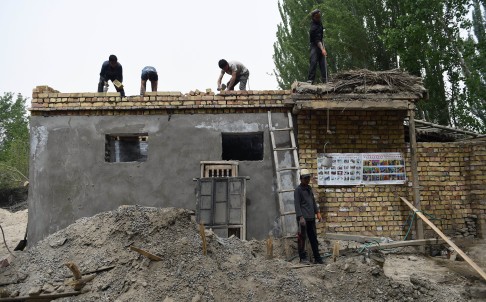Chinese forces shot civilians, claim villagers
Elishku's secret: a civilian slaughter or terror attack?
PUBLISHED : Wednesday, 29 April, 2015, 12:51am
UPDATED : Wednesday, 29 April, 2015, 12:51am
Agence France-Presse in Elishku, Xinjiang

Workers build a house in the town of Elishku, Xinjiang. The township was the scene of a bloody clash in July 2014. Photo: AFP
Something hideously violent happened in Elishku. Whether it was a separatist attack or a civilian massacre is shrouded in the mists of claim and counter-claim that plague Xinjiang .
According to authorities, 96 civilians and terrorists died when militants attacked a police station last July 28. Residents say that hundreds of people mounted a protest against government restrictions on religion which was brutally put down.
"Everyone who joined the crowd is either dead or in jail," said Mahmouti, a local who hid in his home with his wife. "No one has been heard from since, no one knows where they are now."
It is by far the bloodiest incident in Beijing's "strike hard" campaign against violence in Xinjiang, launched after an attack on a train station in Urumqi a year ago tomorrow.
Residents described more than 500 people, some carrying hoes, axes and other farm tools, marching to meet a line of security personnel with assault rifles.
Mahmouti heard them ordering the crowd to "Step back", and moments later, a stream of gunfire. The shooting continued intermittently for hours, he said.
"Anyone who went out that day never came back," said Yusup, a farmer. "It was chaos, maybe 1,000 people vanished."
The villagers are Uighurs, a mostly-Muslim minority that in 2010 made up 46 per cent of Xinjiang's population.
In recent years violence has become more frequent, and has spread beyond the province.
A fatal 2013 car crash in Tiananmen Square struck at the heart of the Chinese state, and a mass stabbing that killed 31 people at Kunming railway station last year was dubbed "China's 9/11" by state media. Another 39 civilians died in a bomb attack on a Han market in Urumqi.
Beijing says such attacks are carried out by separatist Islamist terrorists with overseas connections, but rights organisations blame religious repression.
The Urumqi station attack came as President Xi Jinping visited the city.
"A gang armed with knives and axes attacked a police station and government offices," Xinhua news agency reported.
But residents say a crackdown on women preparing for Eid ul-Fitr sparked the march.
Afterwards, all villagers were placed under house arrest for 20 days. They were ordered to a nearby military barracks and told the official version: that militants from elsewhere incited rioters.
About two months later, 12 people were condemned to death and 15 more given death with a two-year reprieve. Another 29 were sentenced to jail.
That does not account for the hundreds of residents locals say have since disappeared.
Exiled Uighur leader Rebiya Kadeer said in August at least 2,000 people had been killed. Soon afterwards state media reported that a Uighur in Xinjiang had been detained for spreading rumours.
